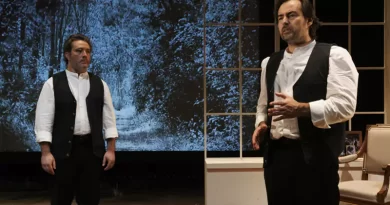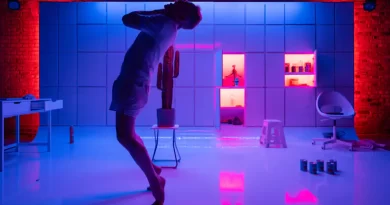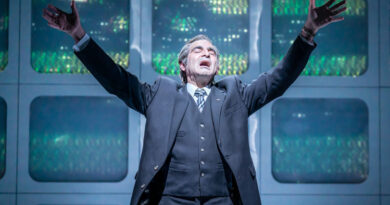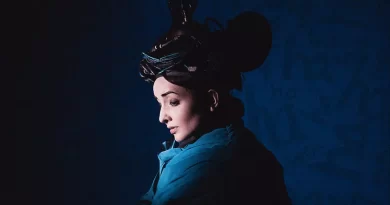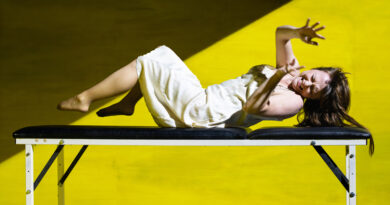“The Beauty Queen of Leenane”: Chichester Festival Theatre (Minerva)
Jeremy Malies in west Sussex
9 September 2021
The cliché is that Martin McDonagh was enthused to write plays about Ireland based on annual holidays he spent in Connemara while growing up in south London. McDonagh himself has rejected the triteness of all this. His trilogy of plays about Leenane (a village in Galway) is set in a liminal and somewhat fairy tale environment; in interviews he has even referenced the Brothers Grimm. None of this gives itself up to simplistic analysis from academics about the Irish diaspora. McDonagh works with countryside rather than country; in his world the seaside in England is no different to, say, a small harbour in County Mayo.

Orla Fitzgerald and Adam Best.
Photo credit: Helen Maybanks.
In less assured and authentically Irish hands, The Beauty Queen of Leenane can be directed with too broad a brush and a stereotypical chocolate box cottage set design that suggests the characters might be living next to affluent city dwellers who have bought second homes. Not so here where designers from Good Teeth Theatre Ltd flood the back screens above the thrust stage of Chichester’s Minerva studio space in stark brooding monochrome. It’s a world of peat bogs and bizarre vegetation that has the quality of an etching. Composer and sound designer Anna Clock reinforces this with strident chords from the cello and bursts of percussion to suggest a booming nearby surf that is anything but picture postcard.
The stage design itself is realistic and more colourful, with closely observed props from the mid-1990s (the play premiered in Galway in 1996). We meet the scheming and iron-willed fake invalid Mag (Ingrid Craigie) and her live-in forty-year-old virginal daughter Maureen (Orla Fitzgerald.) There is abuse going on alright here, but it’s probably two-way. Each is reliant on the other, though we realize later on that the older enfeebled woman holds more cards. Maureen is astute, witty, and grounded. But sometimes things don’t seem right. We’re in 1995, so why is she talking about J.F. and Bobby Kennedy as though they were alive; why is she telling Mag she would opt for Bobby as her lover because he has a kinder face?

Orla Fitzgerald and Kwaku Fortune.
Photo credit: Helen Maybanks.
Director Rachel O’Riordan and voice coach Edda Sharpe ensure that the four-strong cast (including the messenger Ray) excel with McDonagh’s attention to idiom and a dialogue style that brings Gaelic grammar across to Hiberno-English in a potpourri of tenses and flipped syntax. Familiar themes emerge including rivalries between brothers (remember that McDonagh has a brother, John, who is a successful screenwriter), though the brothers who are truly cruel to each other here are unseen characters.
After a welcome party for American visitors in the village, Maureen brings Pato (Adam Best) home with her, and they spend the night together. He is a consummately decent local-born builder who spends many weeks at a time working in London. The second act begins a few weeks later and opens with a celebrated keystone speech – “set piece” doesn’t do it justice, because it’s remarkably fluid. In the fulcrum of the plot, Pato reads aloud a letter he has just written to Maureen from his London digs. The letter looks to the future, a future that Pato wants to spend with Maureen as emigrants to the United States. And yet the tone for us is immediately elegiac – there has been so much foreboding already, I doubt if anybody in the theatre would be optimistic about the couple’s future however much we might be rooting for them.

Kwaku Fortune.
Photo credit: Helen Maybanks.
Best is known for playing a student doctor in the hit BBC One medical drama Holby City. McDonagh’s text is doing much of the work for him, but he renders the letter confessional, tender, generous, and lyrical. It’s a consummate piece of acting in which he convinces with the glimpsed excitement of a chance at love and two new lives. The letter is misdirected – it would be unfair to say how – and for a while the outcome of the plot hinges on to what extent and how quickly the surprisingly sharp Maureen can reconstruct the letter’s contents. O’Riordan (a busy woman – I review her Out West in our London pages here) ratchets up tension here without once veering near melodrama.
It isn’t a spoiler to say that things don’t turn out well. We leave Maureen sitting in her mother’s armchair like a defeated character (minus the stoicism) at the end of a Chekhov play. Stylistically there are nods to James Joyce and J.M. Synge, but this has always been a unique voice. McDonagh once quipped that he has been to the theatre only twenty times, with two of these outings being to see his own work! He has created an idiom that is strange and violent, truly of the people but never merely folkloric.
The Beauty Queen of Leenane has nine scenes in it and runs for two hours. McDonagh wrote the play in a week while working on it for only four hours a day. Always slightly belligerent and evasive in the media, he has never boasted to this effect, but I suspect that he is one of those lucky writers from whom whole speeches simply cascade fully formed. In a programme essay, Garry Hynes of Galway-based Druid Theatre Company recalls being sent a copy of the play when McDonagh was unknown. She says that it leapt off the page as being dramatically right in terms of dialogue, sound, and character. It was indisputably of the area, but she knew it had not been written by a local. The writing had (my words, not those of Hynes verbatim) an extra dimension of truth, and there was a broader perspective as if the characters were being refracted through the optics of a camera lens.



